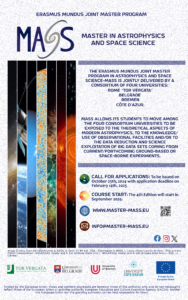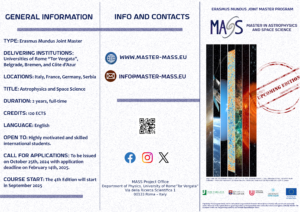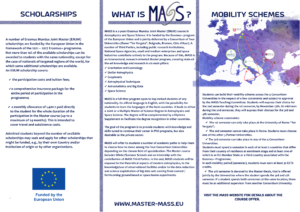Applications for the 2025 course edition closed on 14/02/2025.
Check out the Eligibility requirements and the list of Required Documents before filling in the Application Form!
Call for Applications 2025
MASS
Erasmus Mundus Joint Master
in Astrophysics and Space Science
Application start: October 25th, 2024 at 12:00 p.m. CET
Application deadline: February 14th, 2025 at 23:59 CET
Course starting date: September 15th, 2025
Course duration: 2 years (120 ECTS credits)
Eligible candidates: Top-ranked students of any nationality with a certified good knowledge of English, who hold a recognized Bachelor’s degree in Astronomy, Astrophysics, Physics, Mathematics, Computing Science, Space Engineering, or closely related fields.
Funding: The programme is funded by the European Union within the 2021 – 2027 Erasmus+ programme. A number of Erasmus Mundus Joint Master full scholarships are available for students of any nationality. An additional, EMJM-equivalent scholarship is funded by the Italian Space Agency.
The Masters course is open to students of all nationalities and is jointly offered by a Consortium of 4 Universities:
the University of Rome “Tor Vergata” (Italy),
the University of Belgrade (Serbia),
the University of Bremen (Germany),
the Université Côte d’Azur (France)
with the participation of several associated partners, including public research institutions, national Space Agencies, small and medium enterprises and space industries that contribute actively to the programme.
The programme has a duration of 2 years (120 ECTS credits) and is entirely taught in English.
MASS will give students an excellent education in the field of Astrophysics and Space Science. It will expose them to the theoretical aspects of modern astrophysics, to the knowledge/use of observational facilities and/or to the data reduction and science exploitation of big data sets coming from current/forthcoming ground-based or space-borne experiments. The goal of the programme is to provide students with knowledge and skills tuned to continue their career in PhD programmes, but also desirable to the private sector.
We invite applications from top-ranked students of any nationality that either hold or are expected to obtain a Bachelor’s Degree (or a recognized equivalent Degree that certifies a period of studies of at least 3 years, corresponding to 180 credits in the European Credit Transfer System) in Astronomy, Astrophysics, Physics, Mathematics, Computing Science, Space Engineering, or closely related fields by the end of June 2025, for applicants who need a visa to study in Italy, OR by the end of July 2025, for applicants who are exempt from a visa application to study in Italy . A certified good knowledge of the English language is required.
Students selected for participation will carry out their studies in at least 2 and up to 4 of the MASS consortium universities and will be finally awarded a multiple or joint Master Degree, complemented with a Diploma Supplement. The degree will allow them access to PhD programmes.
A number of full scholarships are available for students of any nationality. These are funded by the European Commission following the Erasmus+ scholarship scheme for Erasmus Mundus Joint Master courses. An additional, equivalent scholarship is funded by the Italian Space Agency.
The selection of students is primarily based on excellence.
Full information about the MASS programme, the application form, and detailed instructions on how to apply can be found on the web-site: https://www.master-mass.eu
Applications are accepted until February 14th, 2025.
Reference letters need to be uploaded directly by recommenders upon receipt of the e-mail invitation and not later than February 21st, 2025.
The contact e-mail for inquiries is: info@master-mass.eu .
Co-funded by the European Union. Views and opinions expressed are however those of the author(s) only and do not necessarily reflect those of the European Union or granting authority European Education and Culture Executive Agency (EACEA). Neither the European Union nor the granting authority can be held responsible for them.



